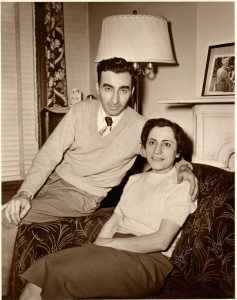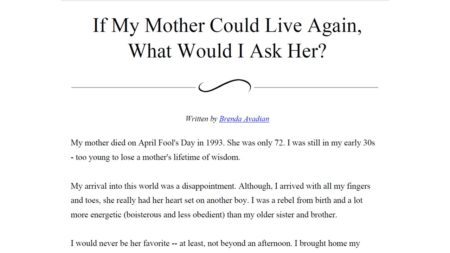Visiting the Cemetery to Pay Respects
Back in the ’60s and early ’70s, while I was a child, families visited the cemetery to pay respects to their loved ones. It was a time and place to reminisce and share stories. Since my family’s graves were in other states, I explored the mausoleums and opulent grave markers of beer barons, industrialists, inventors, political figures, and war heroes in Milwaukee’s Forest Home Cemetery.
 My family—those I knew and who survived the Armenian Genocide—lived and died and were buried in the Midwest and along the West Coast. Families are even more geographically spread out today. Sometimes, I’m curious and ask friends when they visited their loved one’s grave. More often than not, they look down sheepishly and say it’s been years; even for those whose loved ones are buried or interred locally. Times change.
My family—those I knew and who survived the Armenian Genocide—lived and died and were buried in the Midwest and along the West Coast. Families are even more geographically spread out today. Sometimes, I’m curious and ask friends when they visited their loved one’s grave. More often than not, they look down sheepishly and say it’s been years; even for those whose loved ones are buried or interred locally. Times change.
When a loved one dies, they live on in our hearts and memories, assuming Alzheimer’s or other form of dementia hasn’t taken them.
Remembering My Mother on this 30th Anniversary of Her Passing
On April 1, 1993—yes, April Fools’ Day—my father called to tell me my mother died. She was 72. While it’s been almost five years since I last visited their niche (both were cremated), they live on in my day-to-day thoughts. My father died eight years later, on March 31st. This week marks the 30th anniversary since my mother died. It was then, in my early thirties, that I became a half-orphan. After my father’s passing, I felt totally orphaned.
Vibrant Mom. Strict Disciplinarian.
As the youngest of three, what impacted me was my mother’s courage
She loved climbing trees and despite my initial fears, I braved the heights. It was fun climbing trees!
When we walked together, she walked very fast. I had to jog a few steps in between race-walking just to keep up. Today, I walk fast as she once did.
She encouraged us to learn to drive as soon as we wanted. After steering the 1959 Willys Jeep at age 8, I began learning to drive by age 10. That was my father’s job. “Release the clutch slowly. Shift into first. That’s right. Now, press the clutch… release slowly and shift into second.” My feet barely reached the pedals; a pillow at my back helped.
“If you work harder, you can do better,” my mother said when I came home with a 4.0 report card. “What do you mean? That’s the highest I can get!” Back then we didn’t have the opportunity to earn higher-than a 4.0 grade average.
She was a seamstress and wore beautiful dresses, even silk. She took care of her appearance, her health, and remained physically active. She was vibrant. She was funny.
I smile as I reflect upon my mother’s numerous admonitions.
I was a rebel. She had her hands full keeping me in line.
She’d punish me for poor conduct (“talks a lot”) despite perfect or near-perfect academic grades.
Punishment included being hit with a stick and sent to my room without food.
When I forgot to remove candy wrappers from my pockets, I was punished for taking candy from friends. “Who knows where that candy’s been. Germs.” I didn’t have the heart to tell her I set aside some of my own money to buy candy and gum that I shared with others. She taught us to save our money for important things. She even incentivized our saving by rounding up our change to the nearest dollar.
She demanded that I walk the same path to and from school. I didn’t appreciate her concern then and got bored and often diverted my path; especially, while in junior high school. I realized in later years; it was her way to ensure she knew where to look should something happen to me.
Despite my mischievous and rebellious nature, I adhered closely to their values in my lifetime.
 If my mother were alive today, I’d ask her the questions in this article. However, a genocide survivor, she like others, was suspicious of questions that delved into the past.
If my mother were alive today, I’d ask her the questions in this article. However, a genocide survivor, she like others, was suspicious of questions that delved into the past.
[TCV Update 11/22/2023: This article is unavailable due to EzineArticles no longer being operational.] If My Mother Could Live Again, What Would I Ask Her?
Declining Health
With all of my mother’s courage, over the years, I saw her sacrifice much and neglect her own health.
She lost her sense of smell. Still, she managed to make flavorful stews and meats. Of course, losing her sense of smell affected her taste buds, so she made sure to add lots of cayenne pepper to her portion. She couldn’t see close enough to thread a needle, but refused to get reading glasses. When her teeth needed fillings or crowns, she told the dentist to pull them out. Flustered, he warned her that she’d lose all her teeth if he pulled all the ones she wanted. Her smiles featured empty spaces between her teeth.
While my father urged her to go to the doctor for whatever she needed, she gave up. In her 60s, she began to have heart problems. Her heart enlarged as it struggled to pump enough blood. She was repeatedly rushed to the hospital to have her lungs drained so that she could breathe.
During the last decade of her life, with what I know today, I believe she grew severely depressed. She rarely wanted her picture taken. I have three blurry pictures of her later in life.
A once-vibrant and funny person declined.
I remember how severely I hurt approaching the first Mother’s Day following her passing. I no longer had a mom!
I think of her often. She was the one I came home to and told her about my day. She, with her admonitions and encouraging words, was the one who mostly raised me.








